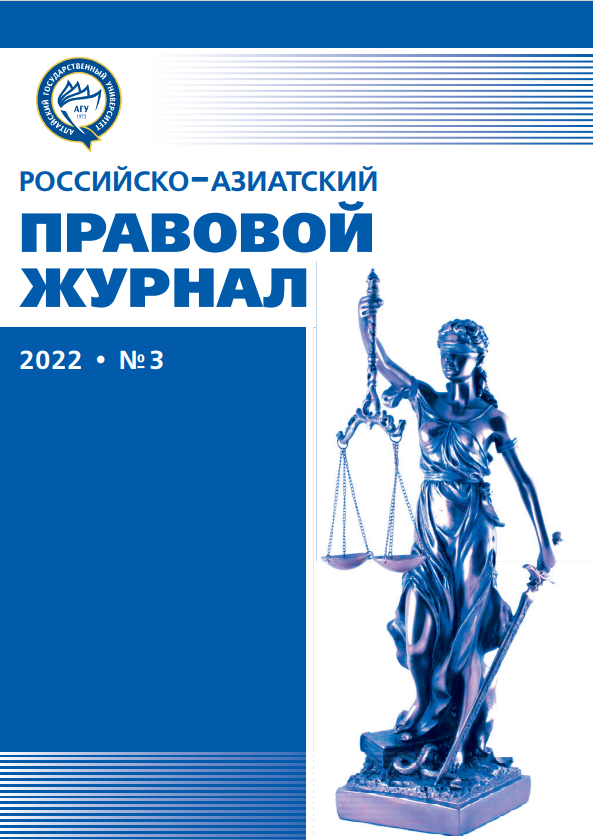LAW OF SCIENCE
УДК 340.15 ББК 67.3
Abstract
The article researches the peculiarities of the methods of scientific law. Different points of view on thisproblem are considered. In accordance with the understanding of scientific law as a complex branch ofRussian law, which regulates the relations in the field of scientific, scientific-technical and related innovationactivities, the authors conclude that it is characterized by a combination of private and public aspects,dispositive and imperative methods of legal regulation based on the range of relations, which are affectedby law.
Downloads
References
2. Берг Л.Н. Проблемы законодательного обеспечения научной деятельности в России // Актуальные проблемы российского права. 2015. №1. URL: https://cyberleninka.ru/article/n/problemyzakonodatelnogo-obespecheniya-nauchnoy-deyatelnosti -v-rossii
3. Савченко Д.А. Механизм правовой охраны научных отношений: основные элементы // Российско-Азиатский правовой журнал. 2020. №2. С. 24–28.
4. Федькин Г.И. Правовые вопросы организации научной работы в СССР. М., 1958. 356 с.
5. Дозорцев В.А., Зенин И.А. Организационно-правовые вопросы руководства наукой в СССР. М., 1973. 423 с.
6. Ринг М.П. Правовое регулирование научно-технического прогресса // Советское государство и право. 1972. №2. С. 111–121.
7. Красавчиков О.А. Категории науки гражданского права. Избранные труды: в 2т. М., 2005. Т. 2. 492 с.
8. Филь М.М. Законопроекты для науки: история и современность // Управление наукой: теория и практика. 2019. Т. 1, №2. С. 59–69.
9. Кашкин С.Ю. Становление права науки как новой комплексной отрасли права // Вестник университета О.Е. Кутафина. 2018. №5. С. 20.
10. Аничкин Е.С. Формирование наднационального научного права как отрасли международного публичного права // Российско-Азиатский правовой журнал. 2019. №2. С. 52 -55.
Russian-Asian Law Journal is a golden publisher, as we allow self-archiving, but most importantly we are fully transparent about your rights.
Authors may present and discuss their findings ahead of publication: at scientific conferences, on preprint servers, in public databases, and in blogs, wikis, tweets, and other informal communication channels.
Russian-Asian Law Journal allows authors to deposit manuscripts (currently under review or those for intended submission) in non-commercial, pre-print servers such as ArXiv.
Authors who publish with this journal agree to the following terms:
- Authors retain copyright and grant the journal right of first publication with the work simultaneously licensed under a Creative Commons Attribution License that allows others to share the work with an acknowledgement of the work's authorship and initial publication in this journal.
- Authors are able to enter into separate, additional contractual arrangements for the non-exclusive distribution of the journal's published version of the work (e.g., post it to an institutional repository or publish it in a book), with an acknowledgement of its initial publication in this journal.
- Authors are permitted and encouraged to post their work online (e.g., in institutional repositories or on their website) prior to and during the submission process, as it can lead to productive exchanges, as well as earlier and greater citation of published work (See The Effect of Open Access).








